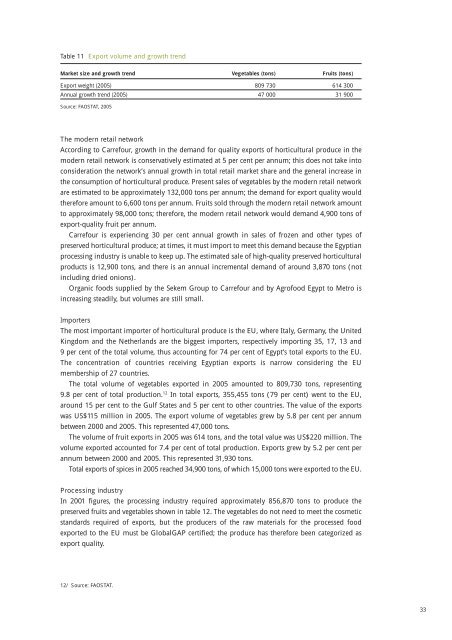Egypt: Smallholder contract farming for high-value and ... - IFAD
Egypt: Smallholder contract farming for high-value and ... - IFAD
Egypt: Smallholder contract farming for high-value and ... - IFAD
You also want an ePaper? Increase the reach of your titles
YUMPU automatically turns print PDFs into web optimized ePapers that Google loves.
Table 11 Export volume <strong>and</strong> growth trend<br />
Market size <strong>and</strong> growth trend Vegetables (tons) Fruits (tons)<br />
Export weight (2005) 809 730 614 300<br />
Annual growth trend (2005) 47 000 31 900<br />
Source: FAOSTAT, 2005<br />
The modern retail network<br />
According to Carrefour, growth in the dem<strong>and</strong> <strong>for</strong> quality exports of horticultural produce in the<br />
modern retail network is conservatively estimated at 5 per cent per annum; this does not take into<br />
consideration the network’s annual growth in total retail market share <strong>and</strong> the general increase in<br />
the consumption of horticultural produce. Present sales of vegetables by the modern retail network<br />
are estimated to be approximately 132,000 tons per annum; the dem<strong>and</strong> <strong>for</strong> export quality would<br />
there<strong>for</strong>e amount to 6,600 tons per annum. Fruits sold through the modern retail network amount<br />
to approximately 98,000 tons; there<strong>for</strong>e, the modern retail network would dem<strong>and</strong> 4,900 tons of<br />
export-quality fruit per annum.<br />
Carrefour is experiencing 30 per cent annual growth in sales of frozen <strong>and</strong> other types of<br />
preserved horticultural produce; at times, it must import to meet this dem<strong>and</strong> because the <strong>Egypt</strong>ian<br />
processing industry is unable to keep up. The estimated sale of <strong>high</strong>-quality preserved horticultural<br />
products is 12,900 tons, <strong>and</strong> there is an annual incremental dem<strong>and</strong> of around 3,870 tons (not<br />
including dried onions).<br />
Organic foods supplied by the Sekem Group to Carrefour <strong>and</strong> by Agrofood <strong>Egypt</strong> to Metro is<br />
increasing steadily, but volumes are still small.<br />
Importers<br />
The most important importer of horticultural produce is the EU, where Italy, Germany, the United<br />
Kingdom <strong>and</strong> the Netherl<strong>and</strong>s are the biggest importers, respectively importing 35, 17, 13 <strong>and</strong><br />
9 per cent of the total volume, thus accounting <strong>for</strong> 74 per cent of <strong>Egypt</strong>’s total exports to the EU.<br />
The concentration of countries receiving <strong>Egypt</strong>ian exports is narrow considering the EU<br />
membership of 27 countries.<br />
The total volume of vegetables exported in 2005 amounted to 809,730 tons, representing<br />
9.8 per cent of total production. 12 In total exports, 355,455 tons (79 per cent) went to the EU,<br />
around 15 per cent to the Gulf States <strong>and</strong> 5 per cent to other countries. The <strong>value</strong> of the exports<br />
was US$115 million in 2005. The export volume of vegetables grew by 5.8 per cent per annum<br />
between 2000 <strong>and</strong> 2005. This represented 47,000 tons.<br />
The volume of fruit exports in 2005 was 614 tons, <strong>and</strong> the total <strong>value</strong> was US$220 million. The<br />
volume exported accounted <strong>for</strong> 7.4 per cent of total production. Exports grew by 5.2 per cent per<br />
annum between 2000 <strong>and</strong> 2005. This represented 31,930 tons.<br />
Total exports of spices in 2005 reached 34,900 tons, of which 15,000 tons were exported to the EU.<br />
Processing industry<br />
In 2001 figures, the processing industry required approximately 856,870 tons to produce the<br />
preserved fruits <strong>and</strong> vegetables shown in table 12. The vegetables do not need to meet the cosmetic<br />
st<strong>and</strong>ards required of exports, but the producers of the raw materials <strong>for</strong> the processed food<br />
exported to the EU must be GlobalGAP certified; the produce has there<strong>for</strong>e been categorized as<br />
export quality.<br />
12/ Source: FAOSTAT.<br />
33

















